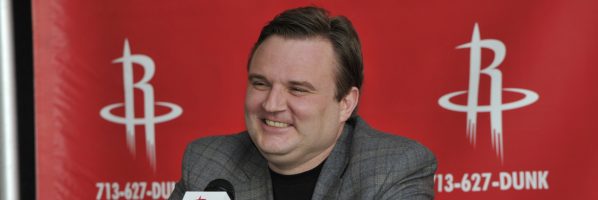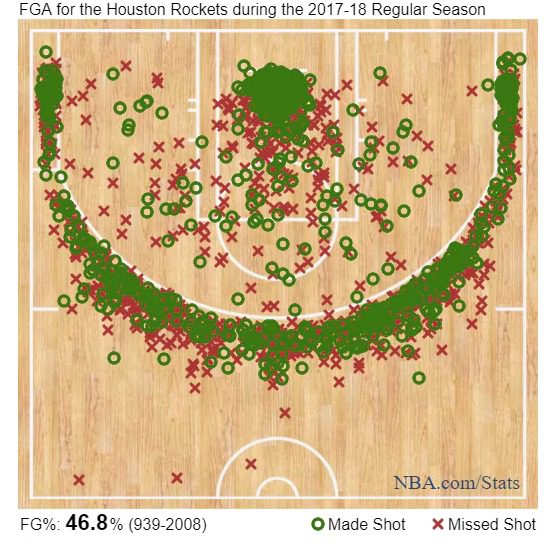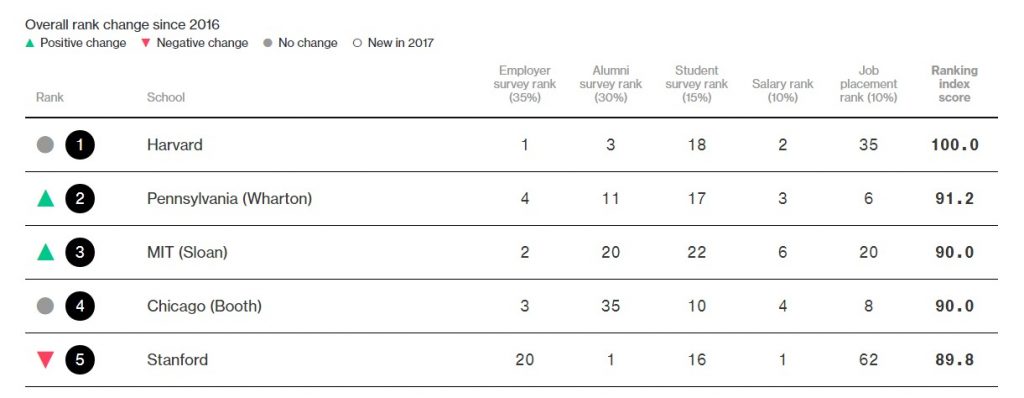Alumni Spotlight: Daryl Morey and Swapping Intuition for Analytics

In 2006, when Houston Rockets owner Les Alexander announced that MIT Sloan School of Management MBA, analytics expert, and relative NBA unknown Daryl Morey would eventually serve as general manager of the team, the basketball community was surprised, to say the least. A Hoopsworld headline, at the time, read, “Daryl Morey? Are You Serious?”
Though using quantifiable data to make business and strategic decisions across the majority of professional sports has become the norm, in 2006, it was far from standard practice, especially in the world of basketball. At the time, Michael Lewis’s book, Moneyball, was just three years old, and it only highlighted the use of analytics in baseball; perhaps the most straightforward team sport to quantify.
Now, 11 years into his career as a general manager, Morey’s use of analytics to guide NBA decisions ranging from draft picks, to whether a player should go for a three-point shot or a mid-range jumper (hint: take the three point shot) has made him a sports statistics pioneer.
Early Life and Career
While growing up in Medina, Ohio, Morey developed a love of sports. But, according to a profile in Slate, after reading articles written by alleged authorities making predictions for sports teams’ successes that proved way off base, Morey began to question the effectiveness of these experts. Shortly after this realization, Morey happened upon a book by the original sports statistics advocate, Bill James, author of the seminal 1977 book The Bill James Baseball Abstract. James’s data-based philosophy immediately resonated with Morey as the way to mold winning sports teams.
Though he knew early on that he wanted to devote his life to sports, Morey was uncertain of how to gain access to the exclusive business side of the industry. During his time at Northwestern University, Morey sent scads of letters to pro teams, begging for a shot at even the most low-ranking jobs. Each of these letters went unanswered. “So I decided at that point that I had to be rich. If I was rich I could just buy a team and run it,” Morey said.
It was this line of thinking that led the young midwesterner to apply to MIT’s Sloan School of Management. After earning his MBA from MIT in 2000, Morey pursued a career in consulting. Eventually this led to a job working for the Boston Celtics. It was during this time that Morey began applying a statistical model he had developed to size up amateur players to the actual draft. Just a couple of years later, Morey was approached about a managing position for the Houston Rockets, where he has now served as general manager for eleven seasons and has just signed on for an additional four years.
Philosophy and Contributions
At just 21-years old, Morey adapted Bill James’s Pythagorean Expectation, a formula used to predict how many games a team would win, to basketball. “I would have never guessed that you could adapt the Pythagorean to basketball,” James said.
In basketball, Morey is partially credited with normalizing the use of analytics in player acquisitions, as well as approach to the actual game. Under his leadership, the Rockets acquired franchise cornerstone James Harden in what is, in hindsight, already considered one of the more lopsided trades in basketball history. Morey was also instrumental in starting the annual MIT Sloan Sports Analytics Conference, a forum wherein students and professionals can exchange views on the role of analytics in the sports industry.
When asked about his thought processes in Northwestern Magazine, Morey said, “You don’t fool yourself, you take a lot of chances, you cut your losses quickly. That’s all you can do.”
Like the slow-crawl of acceptance sabermetrics toiled through in Major League Baseball, Morey’s analytical imprint on the NBA has routinely drawn the ire of some of the game’s most notable figures, including Hall of Famer, “golfer,” and Inside The NBA host Charles Barkley. In 2015, Barkley routinely chided `the Rockets’ paltry defensive efforts, noting Morey’s tactics of bringing in players seemed fairly basic.
Just two years later, however, and the Rockets are currently riding a 10-game win streak and sit atop of the vaunted Western Conference, with Harden earning potential MVP praise and point guard Chris Paul commanding one of the league’s best offenses. And Morey’s analytical emphasis on three point shooting and pick and roll sets, dubbed “Moreyball,” has never been more prominent. The Rockets lead the league—by far—in three-point attempts per contest, launching a blistering 43.2 per game. For context, the team with the second most three-point attempts per game, the Brooklyn Nets, take 33.8 per game—nearly 22 percent less than Houston.

Stats via NBA.com/Washington Post
The Rockets’ analytical trend may seem extreme, but the rest of the league is still taking notice. The average three point attempts taken per game, nearly a quarter of the way into the 2017-18 season, is the highest ever at 28.7 attempts per game per team; and those figures have gone up every year since 2012. If Moreyball remains a staple of the NBA offense, expect that figure to be broken again in 2019.
Other Pursuits
Morey has a love of musicals, and even proposed to his now-wife Ellen before a production of Grease. It makes sense then that the man the New York Times called a “wizard in the field of quantitative analysis,” has chosen to devote his time to producing a musical. The show, “Small Ball,” is slated to debut in 2018.
Columbia Business School Announces New M.S. in Business Analytics Degree

Columbia Business School (CBS), together with Columbia Engineering, yesterday announced a new full-time Master of Science in Business Analytics degree. Distinct from CBS’s MBA degree, the new program features a three-semester curriculum and is really geared toward students who want to learn the modeling techniques and data science tools that help businesses use data to influence decision making. A unique capstone project will serve as a key element of the new program, through which students will work with actual clients and relevant data sets to put the skills they’ve learned to work helping solve those companies’ real-world business problems. The capstone course will extend over the full three semesters of the program.
The program was developed jointly by faculty at both CBS and Columbia Engineering, and the resulting curriculum is designed to prepare graduates to excel in careers both as consulting analysts and associates and as business analysts and data scientists in fields including financial and professional services, technology, advertising and media, and other professions that require both a deep understanding and practical application of data analytics.
“By tapping into the vibrant and diverse business ecosystem that can only be found in New York, Columbia Business School and Columbia Engineering are uniquely situated to offer this new Master’s degree,” CBS Dean Glenn Hubbard said in a statement. “We see this as a must-do program for any future business person who wants to have a leg up in using data to make informed business decisions.”
CBS Enters an Already Crowded Field
Columbia is far from the first to announce a new data analytics master’s program—and it likely won’t be the last. It joins a long and growing list of other leading business schools that have sensed demand from both students and recruiters for programs that marry some of the skill sets of the MBA with the deeper study of data science and analytics that engineering faculty can provide.
MIT Sloan School of Management last year launched its own Master of Business Analytics (MBAn) degree, with leadership and support from the MIT Operations Research Center. In just one year, applications to the program have more than doubled—from 300 to 800—making the degree the most competitive at the school, with an admissions rate of less than 4 percent, the school reports. And just last month Sloan unveiled a new Business Analytics Certificate program that will be open to students in all MIT masters-level programs who want more rigorous academic content focused on data science.
Not to be left out, last month the University of Virginia’s Darden School of Business announced the launch of a new MBA+MSDS dual-degree program, which grants a Master of Data Science degree from UVA’s Data Science Institute and an MBA from Darden in 24 months (tuition for the MBA+MSDA program is the sum of each individual program’s standalone tuition). The program welcomed a pilot cohort this past summer, and Darden is currently accepting applications for the full program, which will launch in 2018.
NYU Stern, for its part, is now accepting applications for the inaugural class of a new specialized one-year Tech MBA, first announced last spring. And just yesterday Stern shared that an $8 million alumni gift will fund creation of a new center for technology, business, and innovation.
YOU MIGHT ALSO LIKE: More Business Schools Training MBA Students for Careers in Tech
Harvard Business School (HBS), too, sees where the action’s at and doesn’t intend to sit idly on the sidelines. In August 2017—together with the Harvard John A. Paulson School of Engineering and Applied Sciences and the Faculty of Arts and Sciences—HBS announced a partnership with 2U, Inc. to deliver a new online certificate program in business analytics. Expected to welcome its first cohort of students in March 2018, the Harvard Business Analytics Certificate Program is designed to help business leaders—including MBA grads—keep up with and leverage the explosion of data now available in every industry.
Some Schools Were Out in Front
Of course, amid this recent flurry of activity to enhance academic offerings at the intersection of technology and business, some schools can claim clear first-mover advantage. MBA students at CMU’s Tepper School of Business can opt to pursue a Technology Leadership MBA Track, a joint partnership between the Tepper School and Carnegie Mellon’s top-ranked School of Computer Science—indeed, it is one of the most popular offerings in the MBA program. Tepper also offers a three-year, dual-degree MBA/Master of Software Engineering program, also in partnership with the School of Computer Science.
And Stanford Graduate School of Business has for several years offered its students the opportunity to pursue a dual degree of significant relevance to students interested in careers in tech. Its joint MA in Computer Science/MBA degree links two of the university’s world-class programs and helps students develop a unique skill set ideal for becoming a manager and/or entrepreneur for new technology ventures. Stanford’s program includes a year of courses at each the GSB and in the Computer Science department followed by a third year of elective courses in both programs, enabling students to shave off one to two semesters it would take to complete both degrees separately.
RELATED: Best Business Schools to Jumpstart Your Career in Tech—Or Advance It
It Only Makes Sense
Whether beginning several years ago or just getting off the ground now, that business schools are recognizing and responding to market demand for business fundamentals married with data science know-how makes complete sense.
“The role of analytics has grown increasingly critical for most sectors of the economy,” Columbia Engineering Dean Mary C. Boyce said in a press release. “Our partnership with Columbia Business School combines our strength in data science, optimization, stochastic modeling, and analytics with their strength in data-driven decision-making for business and marketing to create a rigorous new master’s degree program.”
What Sets Columbia’s New Program Apart?
So what sets the newest program announced yesterday by Columbia apart from others in a crowded field? One distinguishing feature of the M.S. in Business Analytics is the capstone project that will put students to work on real-life consulting projects with companies using the companies’ own data, the school argues. “By working on real-world consulting projects, with real-world data, students will use the modeling techniques and data science tools to provide pragmatic solutions to the practical problems that businesses are facing today,” Costis Maglaras, professor and chair of CBS’s Decision, Risk & Operations Division, said in a press release.
Students in the new Columbia Business analytics degree program will also have valuable access to dedicated career placement services, the school notes, starting with completing a required Professional Development and Leadership course. “The M.S. in Business Analytics combines classroom instruction by distinguished Columbia professors with the experience of working on real-world problems via the capstone project course,” Columbia Engineering Professor Garud Iyengar said in the press release. “We expect this program to have 100 percent placement of its graduates as do our very successful M.S. in Management Science and Engineering and M.S. in Financial Engineering programs.”
Applications are currently being accepted for the first cohort of this new M.S. in Business Analytics. Students can choose to complete the program in one year by taking a summer semester or can take three non-contiguous semesters (fall, spring, fall), which would reserve the possibility of a summer internship.
For more information about the new Columbia M.S. in Business Analytics, click here.
This article has been edited and republished with permissions from our sister site, Clear Admit.
Notre Dame Mendoza Team Takes Top Prize in Annual International Case Competition

A team of Notre Dame Mendoza School of Business MBA students won first place and a cash prize of $5,000 in the 22nd Annual International Case Competition (ICC). The competition was held earlier this month at Carnegie Mellon’s Tepper School of Business and was organized by Tepper’s Operations Management Club.
The competition provides student teams experience in organizing and prioritizing issues, applying decision-making skills, working in teams, and developing innovative solutions—all under the pressure of competition, according to the Operations Management Club. The competition unfolds over two rounds—a 20-minute presentation followed by a 10-minute Q&A session in the first round, and a 30-minute presentation to the judges in the finals.
The Mendoza team was made up of Christopher Kunnen (’18), Austin Gilbertson (’19), and Zachary Kozak (’18). They beat out 10 teams from top universities across the country, including MIT Sloan School of Management and Carnegie Mellon University Tepper School of Business.
“Overall, case competitions are a great experiential component to the MBA experience,” Kozak said. “The competitions combine both real-world problem solving and simulating the time-constraint project management challenges that we as professionals will experience in the future.”

Mendoza’s MBA winners, from left to right: Zachary Kozak, Christopher Kunnen, and Austin Gilbertson/Photo courtesy of the Mendoza College of Business
The Notre Dame MBA team won thanks to their ability to identify the key issues in the case and its development of data-driven insights and recommendations that went beyond expectations.
“We employed a key take-away from one of our favorite professors, Dan Connors, who teaches the course Lessons from Turnaround Situations in the fall term,” Kozak said. “Dan, a former Bain consultant, conveyed to us early on to follow the strategy of ‘Listen, Deliver and then Add’ for any business problem. We replicated this approach when analyzing the problem and then building our presentation.”
ICC also connects leading operations talent with multinational sponsor companies for networking and recruiting opportunities, including Eaton, Amazon, and Emerson.
Harvard Business School Tops Bloomberg Businessweek Ranking

For the third straight year, Harvard Business School reigned supreme in the annual Bloomberg Businessweek “Best Business Schools” ranking, topping the Wharton School at the University of Pennsylvania and MIT Sloan School of Management. In joining HBS on the medals podium this year, those schools both saw significant gains over last year, climbing from sixth and seventh respectively.
Rounding out the top five this year is the University of Chicago Booth School of Business —holding steady year over year at fourth—and Stanford Graduate School of Business, which fell from second place in 2016 to fifth this year.

The methodology Bloomberg Businessweek uses to arrive at its annual MBA ranking involves weighting each of five principle factors. Employer surveys account for 35 percent of a school’s score. Alumni surveys account for another 30 percent. And a combination of current student surveys, salary rankings, and job placement together account for the remaining 35 percent of the final score.
High Risers
Ten out of the top 20 ranked schools in the 2017 Bloomberg Businessweek ranking advanced at least one spot over last year. Wharton and Sloan each managed to leap four spots, boosted by high praise from employers and hefty salary benefits for recent graduates. The University of Washington Foster School of Business also managed to jump from 19th to 15th overall this year, thanks largely to its top ranking as the nation’s best business school for job placement.
The Cornell S.C. Johnson Graduate School of Management and the UCLA Anderson School of Management both saw a rankings jump of three spots, with Johnson moving up to 13th and Anderson coming in at 19th.
The year’s biggest winner, however, may be the Penn State Smeal College of Business, which jumped a whopping 12 spots from last year’s 37th to come in at 25th in 2017. It wins the award for the year’s biggest overall rankings increase. The USC Marshall School of Business also saw a momentous climb this year, sidling up eight spots from 38th last year to 30th this year.
In the latter half of the rankings came another one of this year’s biggest risers, with the Terry College of Business at the University of Georgia jumping 11 spots from last year, up from 65th overall to 54th. Elsewhere, the David Eccles School of Business at the University of Utah, the Whitman School of Management at Syracuse University, the C.T. Bauer College of Business at the University of Houston, and the Pepperdine University Graziadio School of Business and Management all saw a jump of at least seven spots in the new ranking.
Once Mighty, Now Fallen
Stanford GSB, Duke’s Fuqua School of Business, Dartmouth’s Tuck School of Business, and Jones School of Business at Rice University may all be feeling a wee bit dizzy. Last year Stanford shot up to second from seventh the year before, but this year it finds itself demoted to fifth. Duke’s Fuqua School, which last year celebrated a momentous jump from eighth to third, this year fell back down to seventh. Dartmouth’s Tuck School of Business, which had one of last year’s biggest gains, rocketing up nine spots to break into the top five from a mere 14th place finish the year before, this year finds itself at seventh. Similarly, Rice Business, as the Jones School likes to be called, which last year catapulted 11 spots to number eight, this year slipped to tenth. But at least all maintained their footing within the top 10.
Emory’s Goizueta Business School and the Texas A&M Mays Business School, for their part, slipped out of the top 20 altogether. Goizueta slipped just slightly, from 20th to 21st, and Mays slid from 18th to 22nd. The University of Virginia Darden School of Business also stumbled, slipping from 12th last year to 17th this year. But the Charlottesville school at least managed to remain in the top 20, thanks in part to strong scores in the student survey and salary categories.
No school, however, lost more ground than the George Washington University School of Business, which fell an eye-popping 14 spots from last year, losing its place among the top 50 business schools in the United States.
Bloomberg BW has made multiple changes to its methodology in recent years, resulting in significant volatility in terms of where schools fall on the list even when not much has changed year over year at the individual schools themselves. This has led many to question the credibility of the ranking overall. That said, Clear Admit’s Alex Brown found this year’s results easier to swallow than some in recent years. “This ranking seems more reasonable to me this year,” he says. “Each of the M7 programs are in the top 10, and the schools I would consider in the top 16 are all in the top 20.”
You can view the complete 2017 Bloomberg Businessweek rankings here.
This article has been edited and republished with permissions from Clear Admit.
Zipcar Founder and MIT Sloan Grad Robin Chase Offers Entrepreneur Advice

Last month, Zipcar founder and “Peers Inc” author Robin Chase, ‘86, spoke at MIT Sloan‘s Women in Management’s Push for Parity Week, offering three incredibly valuable lessons to those in attendance.
Which Boston MBA Programs Offer the Best Return on Investment?

A stellar résumé, well-targeted recommendation letters, and a strong GMAT score may be vital in earning a spot in your dream business school, but one factor that may weight heavier than everything else is the return on investment. Will the school be worth it? How successful are its alumni? How do employers feel about the school name on a diploma?
A person needs to know that their time—and money—will amount to success and a well-paying job. If Boston‘s the city for you, here are the top four business schools if return on investment, or ROI for short, is on your mind.
#1) Harvard Business School
This prestigious university might come as no surprise as first on our list. But it’s not at the top for nothing. Home of one of the world’s first MBA programs, Harvard Business School is a bit separate from the main campus itself in Cambridge, sitting in Boston’s Allston neighborhood.
Unsurprisingly, the program’s ROI is highly-competitive. Tuition at HBS currently costs around $72,000. That’s a lot more than how much a student might pay per year elsewhere, even without considering the usually stellar track record of HBS grads. Graduates in 2016 had median base salaries of $135,000 with a median signing bonus of $25,000. Sixty-eight percent received a signing bonus. That’s a lot of people. And it’s a pretty sure thing. Work hard at Harvard, and it appears you’re sure to reap the benefits.
READ MORE: HBS Announces Largest-Ever Scholarship Donation
#2) Sloan School of Management – MIT
At MIT’s Sloan School of Management, students can feel certain they’ll succeed after graduation. Individuals, of course, may determine their own success, but Sloan knows how to get its students there. The school is known for its business offerings, particularly its global Sloan Fellows program. There, students can walk away with an executive MBA in just one year. Sloan has been growing its educational base since 1914 when its “Engineering Administration” course set a business tone in the technical school.
Currently, tuition at MIT Sloan sits at $71,000, which isn’t much less than Harvard’s. The median base salary for 2016 graduates was $125,000, with salary ranging anywhere from $40,000 to $200,000.
The business school can provide a myriad of opportunities, especially through its various centers and initiatives, which focus on, science, innovation, medical research, and more.
#3) D’Amore-McKim School of Business – Northeastern University
This business school is tucked in Boston’s arts neighborhood, the Fenway Cultural District. Northeastern University offers multiple campuses, but the MBA programs take place at the D’Amore-McKim School of Business.
MBA students pay the same tuition for classes online or in person: $1,560 per credit hour. For a year, that’s roughly $28,080—significantly less than the aforementioned Harvard and MIT. So if you’re not ready or can’t afford to drop a bunch of money on costs, D’Amore-McKim might be the program for you. Its graduates go on to make $81,000 a year, which is nearly 66 percent more than yearly tuition. The top base salary for recent alumni is $115,000.
These employment opportunities come quickly: 96 percent of D’Amore-McKim alumni accept a job offer within three months of graduation.Companies like Zipcar and Hasbro, Inc., hired graduates last year. Resources like the Graduate Career Center and the school’s clubs can help students make it. Clubs like the Emerging Markets Club gives students the hands-on experience they need to succeed.
#4) Questrom School of Business – Boston University
The Questrom School of Business at Boston University offers a variety of MBA programs. The first was launched in 1925, but the school went on to add an executive MBA, public and nonprofit MBAs, evening MBAs, and health sector MBAs.
A full-time MBA tuition costs $51,916 at Boston University. The prices vary depending on which program a student decides is right for them, which contributes to the school’s placement on the list. For example, the executive MBA costs nearly double the traditional MBA rate. However, alumni do go on to make that money back. In 2016, graduates’ mean base salary was $100,820. About 92 percent of graduates accepted a job offer just three months after earning a degree, with nearly all taking an internship. Places like General Motors and IBM hired recently hired Questrom grads.
You could be next. But it’s up to you to decide what school makes the most sense for you. You’re onto something with Boston though. The seafood will never end, and the accents will always entertain. Find the city’s best executive MBA program or explore its one-year MBAs if you need just a little bit more info.
